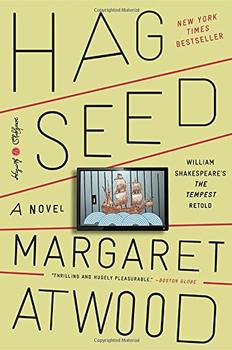Summary | Excerpt | Reviews | Beyond the book | Read-Alikes | Genres & Themes | Author Bio

A Novel
by Dexter PalmerProspero Taligent is mad. He is also the richest man in the world, an inventor, industrialist and entrepreneur who can do just about anything he likes. He lives in The Dream of Perpetual Motion's early 20th century alternate reality, where one can find technology as futuristic as flying mechanical men, and as retro as food automats and Victrolas. In the city of Xeroville, Prospero's madness seems to have tainted everyone, as evidenced by the need for "Shrink Cabs," which offer psychiatric therapy as well as a ride.
The story begins at the end; that is, we first meet Harold when he is already trapped aboard the Zeppelin, Chrysalis, where he can hear the voice of Prospero's daughter, Miranda, speaking to him, but cannot tell where she is. He suspects, but cannot prove, that the perpetual motion engine keeping the ship afloat is gradually running down. Harold refuses to speak to Miranda, but decides to tell his story in writing. Thus, we begin the tale of Harold's adventure and the events that brought him to this point. The novel is broken up into many short chapters which usually signal a change in setting or speaker. While debut novelist Dexter Palmer anchors the story by making Harold the primary narrator, some readers may find the frequent changes of voice or setting irritating.
Palmer has a Ph.D. in English, evidenced by his many direct and indirect references to literature, including The Tempest, The Merchant of Venice, Hamlet, and various non-Shakespearean works. Some are overt, such as the character's names. But there are also more veiled allusions to Frankenstein and Charlie and the Chocolate Factory. In fact, the book has so many layers having little to do with the main plot that some readers may feel a bit overwhelmed.
Although it has steampunk trappings and a focus on mechanical inventions, I found The Dream of Perpetual Motion to be, at heart, a book about communication, particularly the dichotomy of language and silence. Prospero (who turns out to be quite the misogynist), is obsessed with silence, particularly in women. Even of his own daughter, Miranda, he says, "She would have stayed perfect if she'd come of age in silence."
Harold, while he is not afraid of silence, is a storyteller, a maker of words (and, Prospero says, "a maker of lies"). While he makes a poor romantic hero, he's a good champion of language. Even when he refuses to speak aboard the Chrysalis, he communicates via his journals. He knows that there is a difference between writing and speaking; yet, for Harold, it is vitally important to have "faith in language," without which all meaning falls away. Harold acknowledges that language, powerful as a weapon, can create reality, and it can also destroy possibilities. When Harold says near the end of the book, "describing words are killing words," he means that description reduces the possibilities to a single reality. For that reason, he ultimately decides not to try to describe Miranda once he finds her aboard the ship. He does not want to reduce her to a simple characterization, nor does he want to use language to destroy, as "there's been killing enough" since his journey began.
Palmer has said that one of the joys of writing a novel (as opposed to an academic paper), is that it allows the reader to interact with the text and bring to it his or her own interpretation. As an English Ph.D. myself, I enjoyed analyzing and interpreting the book as much as reading it, but The Dream of Perpetual Motion will not be everyone's cup of tea. If you like many-layered, literary novels you'll find much to appreciate, even if you're not usually a reader of science fiction or steampunk. In spite of a few flaws, Palmer's debut indicates that he is a very promising writer.
View an art gallery of works inspired by The Dream of Perpetual Motion
![]() This review was originally published in The BookBrowse Review in April 2010, and has been updated for the
February 2011 edition.
Click here to go to this issue.
This review was originally published in The BookBrowse Review in April 2010, and has been updated for the
February 2011 edition.
Click here to go to this issue.

If you liked The Dream of Perpetual Motion, try these:

by Marc-Uwe Kling
Published 2020
What if the perfect world wasn't built for you?

by Margaret Atwood
Published 2017
William Shakespeare's The Tempest retold as Hag-Seed.
Be careful about reading health books. You may die of a misprint.
Click Here to find out who said this, as well as discovering other famous literary quotes!
Your guide toexceptional books
BookBrowse seeks out and recommends the best in contemporary fiction and nonfiction—books that not only engage and entertain but also deepen our understanding of ourselves and the world around us.